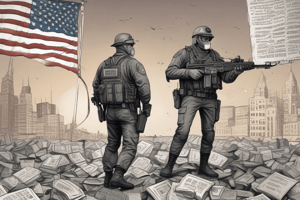Podcast
Questions and Answers
What does the term 'Proof beyond a reasonable doubt' refer to?
What does the term 'Proof beyond a reasonable doubt' refer to?
- A type of plea agreement
- A standard for civil cases
- A standard used to determine a defendant's guilt in a criminal case (correct)
- A method of jury selection
What is required for an officer to carry out a search and seizure?
What is required for an officer to carry out a search and seizure?
- A search warrant (correct)
- An arrest warrant
- A verbal agreement with the suspect
- Witness approval
What does the Carroll Doctrine specify regarding search?
What does the Carroll Doctrine specify regarding search?
- Searches are not allowed without the driver's consent
- Officers can only search a driver's personal belongings
- The search is limited to the driver's seat area only
- The scope of the search includes the entire vehicle and containers where evidence may be found (correct)
What justifies a warrantless entry under exigent circumstances?
What justifies a warrantless entry under exigent circumstances?
What does an arrest warrant authorize?
What does an arrest warrant authorize?
What is a Risk Protection Order intended to do?
What is a Risk Protection Order intended to do?
What does impound refer to in a law enforcement context?
What does impound refer to in a law enforcement context?
What is the purpose of a Notice To Appear?
What is the purpose of a Notice To Appear?
What is the primary purpose of statutory law?
What is the primary purpose of statutory law?
What defines a misdemeanor?
What defines a misdemeanor?
Which of the following best describes procedural due process?
Which of the following best describes procedural due process?
An accessory after the fact is defined as a person who:
An accessory after the fact is defined as a person who:
What does criminal intent refer to?
What does criminal intent refer to?
Which of the following is NOT a characteristic of civil law?
Which of the following is NOT a characteristic of civil law?
What distinguishes a felony from a misdemeanor?
What distinguishes a felony from a misdemeanor?
Which statement about ordinances is accurate?
Which statement about ordinances is accurate?
What is the purpose of a Probable Cause Affidavit?
What is the purpose of a Probable Cause Affidavit?
Which type of liability involves being found guilty of committing a crime?
Which type of liability involves being found guilty of committing a crime?
What does 'omission' refer to in the context of law?
What does 'omission' refer to in the context of law?
What is meant by 'Qualified Immunity'?
What is meant by 'Qualified Immunity'?
What does 'vicarious liability' entail?
What does 'vicarious liability' entail?
Sovereign Immunity is derived from the idea that:
Sovereign Immunity is derived from the idea that:
What does 'acting within the scope of employment' mean?
What does 'acting within the scope of employment' mean?
What is the function of U.S. District Courts?
What is the function of U.S. District Courts?
What is the primary role of the prosecutor in court?
What is the primary role of the prosecutor in court?
Which court is the highest authority in the judicial branch of the United States?
Which court is the highest authority in the judicial branch of the United States?
What is the function of a court administrator?
What is the function of a court administrator?
In a trial, what is the role of a jury?
In a trial, what is the role of a jury?
What does the term 'hearsay' refer to in legal proceedings?
What does the term 'hearsay' refer to in legal proceedings?
What is the purpose of an arraignment?
What is the purpose of an arraignment?
What is the function of a clerk of the court?
What is the function of a clerk of the court?
What does 'off the record' mean in a court context?
What does 'off the record' mean in a court context?
What does probable cause refer to in a legal context?
What does probable cause refer to in a legal context?
Which of the following best describes general intent?
Which of the following best describes general intent?
What is the primary implication of recklessness in legal terms?
What is the primary implication of recklessness in legal terms?
How does law define breach of duty?
How does law define breach of duty?
What constitutes compensatory damages?
What constitutes compensatory damages?
What is a consensual encounter in law enforcement?
What is a consensual encounter in law enforcement?
What is the role of reasonable suspicion in law enforcement?
What is the role of reasonable suspicion in law enforcement?
What does the plain touch/feel doctrine permit officers to do?
What does the plain touch/feel doctrine permit officers to do?
Flashcards are hidden until you start studying
Study Notes
Statutory Law
- Created by Congress, state legislatures, or local authorities in response to specific needs.
Criminal Law
- Defines behaviors unacceptable to society and includes various levels of offenses.
Ordinances
- Laws specific to municipal or county governments.
Civil Law
- Involves legal actions taken to resolve non-criminal private disputes between individuals.
Case Law
- Established by decisions from the court system, forming the basis of judicial law.
Due Process
- Ensures fair and equal application of laws to all individuals, including the accused.
Substantive Due Process
- Emphasizes the fair enforcement of laws.
Procedural Due Process
- Focuses on the legal procedures protecting individuals’ rights during the criminal justice process.
Offense
- Breach of law that encompasses criminal and non-criminal acts punishable under specific jurisdictions.
Non-criminal Violation
- Does not constitute a crime and is not punishable by jail time.
Misdemeanor
- A criminal offense with a maximum penalty of one year in county jail.
Felony
- A serious crime with penalties including death or imprisonment for over one year.
Enhanced Penalty
- Sentence increase due to prior convictions or the severity of the circumstances of the offense.
Principal in the First Degree
- Individual who directly commits a criminal act, regardless of its classification.
Accessory After the Fact
- Someone who assists the principal in evading law enforcement post-crime.
Criminal Intent
- Deliberate decision to engage in unlawful or negligent behavior.
Probable Cause
- Reasonable grounds to believe someone has committed a crime, based on circumstances.
General Intent
- Relates to most criminal offenses requiring a forbidden act.
Specific Intent
- Intent to commit a crime and permanently deprive someone of property.
Transferred Intent
- When harm intended for one individual inadvertently affects another.
Recklessness
- Implies liability for harm caused without intent.
Negligence
- Fails to exercise reasonable care resulting in harm to another.
Breach of Duty
- Failure to fulfill an obligation resulting in unreasonable behavior.
Proximate Cause
- Legal connection between the breach of duty and resulting damages.
Compensatory Damage
- Aims to reimburse for actual losses or injuries.
Punitive Damages
- Meant to penalize the defendant and deter future misconduct.
Consensual Encounter
- Voluntary contact where individuals are free to leave at any time.
Investigative Stop
- Requires reasonable suspicion that law violations are occurring or imminent.
Reasonable Suspicion
- Justifies a temporary investigative stop.
BOLO (Be On Look Out)
- Descriptive alert for identifying suspects or vehicles.
Plain Touch/Feel Doctrine
- Allows officers to seize contraband based on lawful touch, not limited to weapons.
Contraband
- Items that are illegal to possess, produce, or transport.
Pretext Stops
- Vehicle stops for minor violations aimed at investigating more serious offenses.
Proof Beyond a Reasonable Doubt
- Standard for determining criminal guilt.
Search
- Intrusion into a place where privacy is expected.
Seizure
- Infringement on a person's property rights through physical control.
Search Warrant
- Court order authorizing law enforcement to conduct searches or seizures.
Carroll Doctrine
- Permits Searches of an entire vehicle, including containers where evidence may be found.
Exigent Circumstances
- Emergencies justifying warrantless entries.
Fresh Pursuit
- Continuous pursuit of a suspect avoiding arrest.
Impound
- Towing of vehicles directed by law enforcement.
Forfeiture
- Legal process transferring property ownership from the defendant to law enforcement.
Risk Protection Order
- Temporarily restricts access to firearms for individuals posing danger to themselves or others.
Arrest
- Legal deprivation of a person's liberty.
Arrest Warrant
- Court order mandating law enforcement to apprehend an individual.
Notice To Appear
- Written order requiring a person to appear in court without physical arrest.
Probable Cause Affidavit
- Sworn statement detailing circumstances justifying an arrest.
Deadly Force
- Any force expected to cause death or severe injury.
Criminal Liability
- Result of being found guilty of a crime, leading to penalties.
Civil Liability
- Responsibility for wrongful acts causing injury or property damage, often related to negligence.
Tort
- Civil wrongs violating the rights of individuals.
Omission
- Failure to fulfill legal or duty obligations.
Color Of Law
- Law enforcement actions must adhere to established legal standards.
Direct Liability
- Arises from an officer's intentional or negligent misconduct violating agency policies.
Vicarious Liability
- Responsibility held for actions committed by another.
Sovereign Immunity
- Legal doctrine that protects government officials from lawsuits under certain conditions.
Acting Within the Scope of Employment
- Employee actions that reasonably relate to their official duties.
Qualified Immunity
- Protects officials from civil liability unless they violate clearly established rights.
County Courts
- Handle limited jurisdiction legal issues within their counties.
Florida District Courts of Appeal
- Intermediate appellate courts reviewing lower court decisions in Florida.
Florida Supreme Court
- The highest judicial authority in Florida.
U.S. District Courts
- Federal trial courts overseen by district judges and magistrates.
Courts Of Appeal
- Review district court decisions and appeals from federal agencies.
Supreme Court Of The United States
- The highest court in the country, overseeing judicial matters.
Judge
- Presides over court proceedings and rules on legal matters.
Prosecutor
- Represents the government in criminal cases.
Defense Attorney
- Advocates for the rights of the defendant in legal proceedings.
Clerk Of The Court
- Responsible for court records, files, and maintaining official documents.
Court Administrator
- Manages daily operations of the court system.
Jury
- Group of citizens responsible for determining fact-based questions in trials.
Bailiff
- Court officer ensuring security and order during court sessions.
Court Reporter
- Documents all court proceedings for official records.
Hearsay
- Evidence based on unverified statements rather than direct evidence.
Arraignment
- Hearing to formally present charges to the defendant.
Pretrial Release
- Allows defendants to be free from jail while awaiting trial.
Bond Hearing
- Discussion regarding bail and release conditions at initial court appearance.
Deposition
- Sworn testimony given outside of court by witnesses before trial.
Off The Record
- Information not formally documented in court records.
Studying That Suits You
Use AI to generate personalized quizzes and flashcards to suit your learning preferences.




